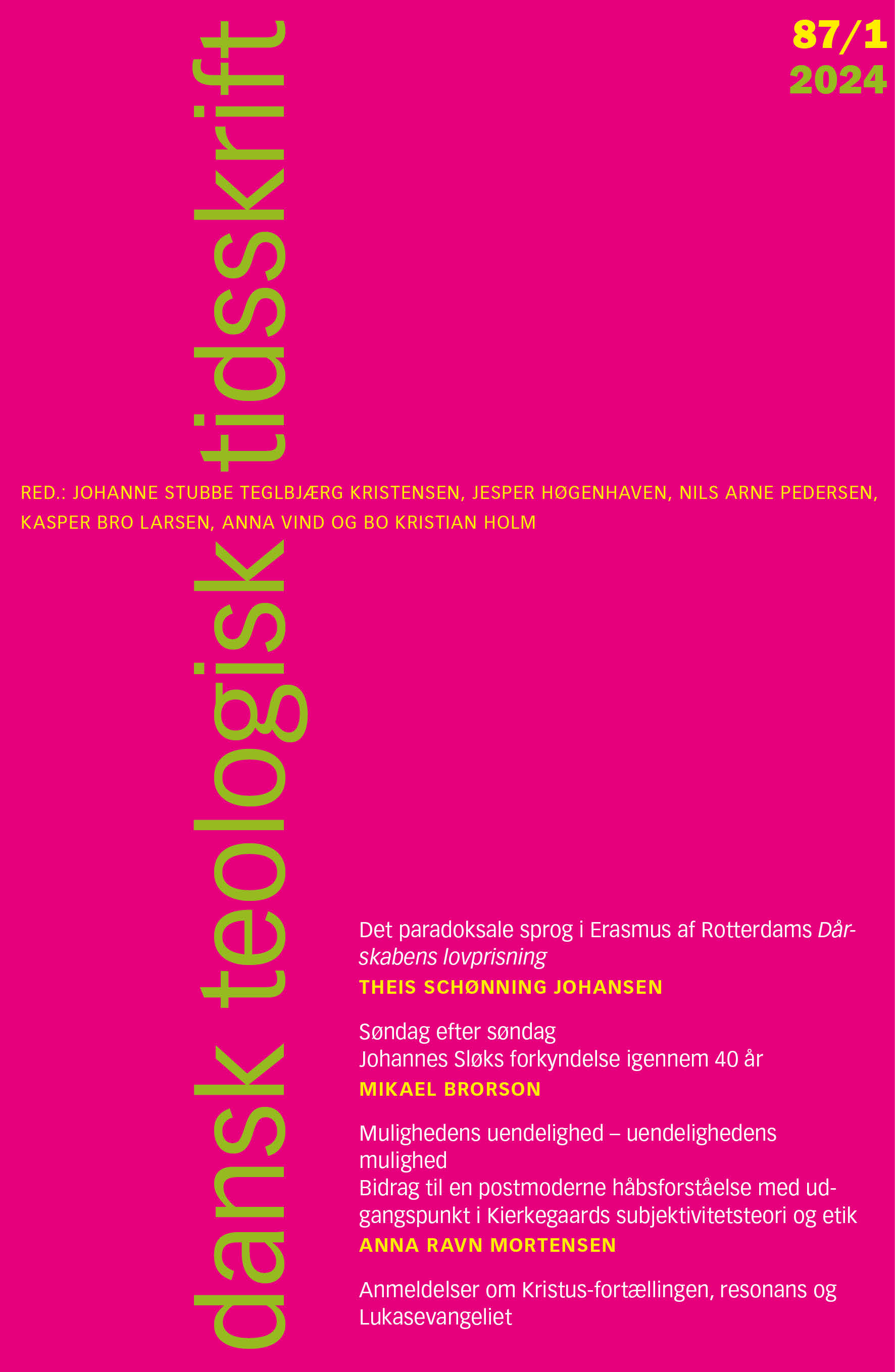Det paradoksale sprog i Erasmus af Rotterdams Dårskabens lovprisning
DOI:
https://doi.org/10.7146/dtt.v87i1.143087Nøgleord:
Erasmus of Rotterdam, The Praise of Folly, Günter Bader, Theologia crucis, Paradox, Freedom of Will, Folly/WisdomResumé
Erasmus of Rotterdam’s The Praise of Folly is a highly original paradoxical encomium in that the praise is undertaken by Folly herself. In his insightful work, Günter Bader points out the structural importance and theological consequences of this second-degree paradox in Folly’s self-praise, from which this article has drawn inspiration in order to understand among other things the complexity of the role of language and words in relation to the cognition of things in The Praise of Folly. This complexity undoubtedly pertains to other works in the opus of Erasmus, as is shown in the article, which forces us to reconsider our reception and interpretation of Erasmian Christology, Pneumatology and anthropology.
Referencer
Erasmus af Rotterdam. 1910. Opus Epistolarum Des. Erasmi Roterodami, vol. II, 1514-1517, red. P.S. Allen. Oxford: Oxford University Press.
Erasmus af Rotterdam. 1967. Ratio seu Methodus compendio perveniendi ad veram Theologiam. I Ausgewählte Schriften, bd. III, red. Gerhard B. Winkler, 117-495. Darmstadt: Wissenschaftliche Buchgesellschaft.
Erasmus af Rotterdam. 1971. Ratio studii ac legendi interpretandique auctores. I Opera Omnia Desiderii Erasmi Roterodami, Ord. I, bog 2, red. Jean-Claude Margolin, 111-151. Amsterdam: North-Holland Publishing Company.
Erasmus af Rotterdam. 1975. Moriae encomium sive Stultitiae laus. I Ausgewählte Schriften, bind II, red. Wendelin Schmidt-Dengler, 1-211. Darmstadt: Wissenschaftliche Buchgesellschaft.
Erasmus af Rotterdam. 1979. Tåbelighedens Lovprisning, oversat og indledt af Villy Sørensen. København: Gyldendal.
Erasmus af Rotterdam. 1981. Adiagorum Chilias Tertia. I Opera Omnia Desiderii Erasmi Roterodami, Ord. II, bog 5, red. F. Heinimann & E. Kienzle, 159-190. Amsterdam: North-Holland Publishing Company.
Augustijn, Cornelis. 1991. Erasmus: His Life, Works, and Influence, oversat af J.C. Grayson. Toronto: University of Toronto Press.
Bader, Günter. 1983. “”Erfahrung mit der Erfahrung.”” I Wirkungen hermeneutischer Theologie: Eine Zürcher Festgabe zum 70. Geburtstag Gerhard Ebelings, udg. af H.F. Geiβer & W. Mostert, 137-153. Zürich: Theologischer Verlag.
Bader, Günter. 1985. Assertio. Drei fortlaufende Lektüren zu Skepsis, Narrheit und Sünde bei Erasmus und Luther. Tübingen: Mohr Siebeck.
Bader, Günter. 2015. “Luther’s Theologica Paradoxa in Erasmus and Cusanus.” I The Wisdom and Foolishness of God, red. C. Chalamet & H.-C. Askani, 139-165. Minneapolis: Fortress Press.
Christ-von Wedel, Christine. 1981. Das Nichtwissen bei Erasmus von Rotterdam. Basel/Frankfurt am Main: Verlag Helbing & Lichtenhahn.
Christ-von Wedel, Christine. 1987. “Das ‘Lob der Torheit’ des Erasmus von Rotterdam im Spiegel der spätmittelalterlichen Narrenbilder und die Einheit des Werkes.” Archiv für Reformationsgeschichte 78: 24-36.
Geraldine, Sister M. 1964. “Erasmus and the Tradition of Paradox.” Studies in Philology 61: 41-63.
Havsteen, Sven Rune. 2020. “Moments of an Aesthetics of the Invisible: The sermo humilis.” I In-visibility. Reflections upon Visibility and Transcendence in Theology, Philosophy and Arts (Refo500 Academic Studies 18), red. Anna Vind m.fl., 319-338. Göttingen: Vandenhoeck & Ruprecht.
Hegel, G.W.F. 2019. Åndens Fænomenologi, oversat og indledt af Claus Bratt Østergaard. København: Gyldendal.
Hoffmann, Manfred. 1994. Rhetoric and Theology: The Hermeneutic of Erasmus. Toronto/Buffalo/London: University of Toronto Press.
Johansen, Theis Schønning. 2022. Ordet hos Luther. Martin Luthers forståelse af Guds ord i striden med Erasmus af Rotterdam. København: Københavns Universitet, upubliceret prisopgavebesvarelse.
Kahn, Victoria. 1982. “Stultitia and Diatribe: Erasmus’ Praise of Prudence.” The German Quarterly 55: 349-369.
Kaiser, Walter. 1963. Praisers of Folly. Erasmus, Rabelais, Shakespeare. Cambridge, Massachusetts: Harvard University Press.
Kristeller, Paul Oskar. 1970. “Erasmus from an Italian Perspective.” Renaissance Quarterly 23: 1-14.
Lausberg, Heinrich. 1990. Handbuch der Literarischen Rhetorik. Stuttgart: Franz Steiner Verlag.
Miller, Clarence H. 1979. “Introduction.” I Opera Omnia Desiderii Erasmi Roterodami, Ord. IV, bog 3, red. C.H. Miller, 13-64. Amsterdam: North-Holland Publishing Company.
Olin, John C. 1979. Six Essays on Erasmus. New York: Fordham University Press.
Pavlovskis, Zoja. 1983. The Praise of Folly. Structure and Irony. Leiden: E.J. Brill.
Popkin, Richard. 2003. The History of Scepticism: From Savonarola to Boyle. Oxford/New York: Oxford University Press.
Rebhorn, Wayne A. 1974. “The Metamorphoses of Moria: Structure and Meaning in The Praise of Folly.” Publications of the Moderne Language Association in America 89: 463-476.
Sextus Empiricus. 1933. Outlines of Pyrrhonism, oversat af R. G. Bury. Loeb Classical Library 273. Cambridge, Massachusetts: Harvard University Press.
Sigurdson, Ola. 2021. Gudomliga Komedier: Humor, subjektivitet, transcendens. Volym 1: Antiken til renässancen. Göteborg: Glänta produktion.
Sister Geraldine Thompson. 1973. Under Pretext of Praise. Satiric Mode in Erasmus’ Fiction. Toronto: University of Toronto Press.
Walter, Peter. 1991. Theologie aus dem Geist der Rhetorik: zur Schriftauslegung des Erasmus von Rotterdam. Tübinger Studien zur Theologie und Philosophie 1. Mainz: Matthias-Grünewald-Verlag.
Wulfram, Hartmut. 2011. “Sehen und Gesehen werden: Der lachende Demokrit bei Horaz und Juvenal.” Wiener Studien vol. 124: 143-164.





